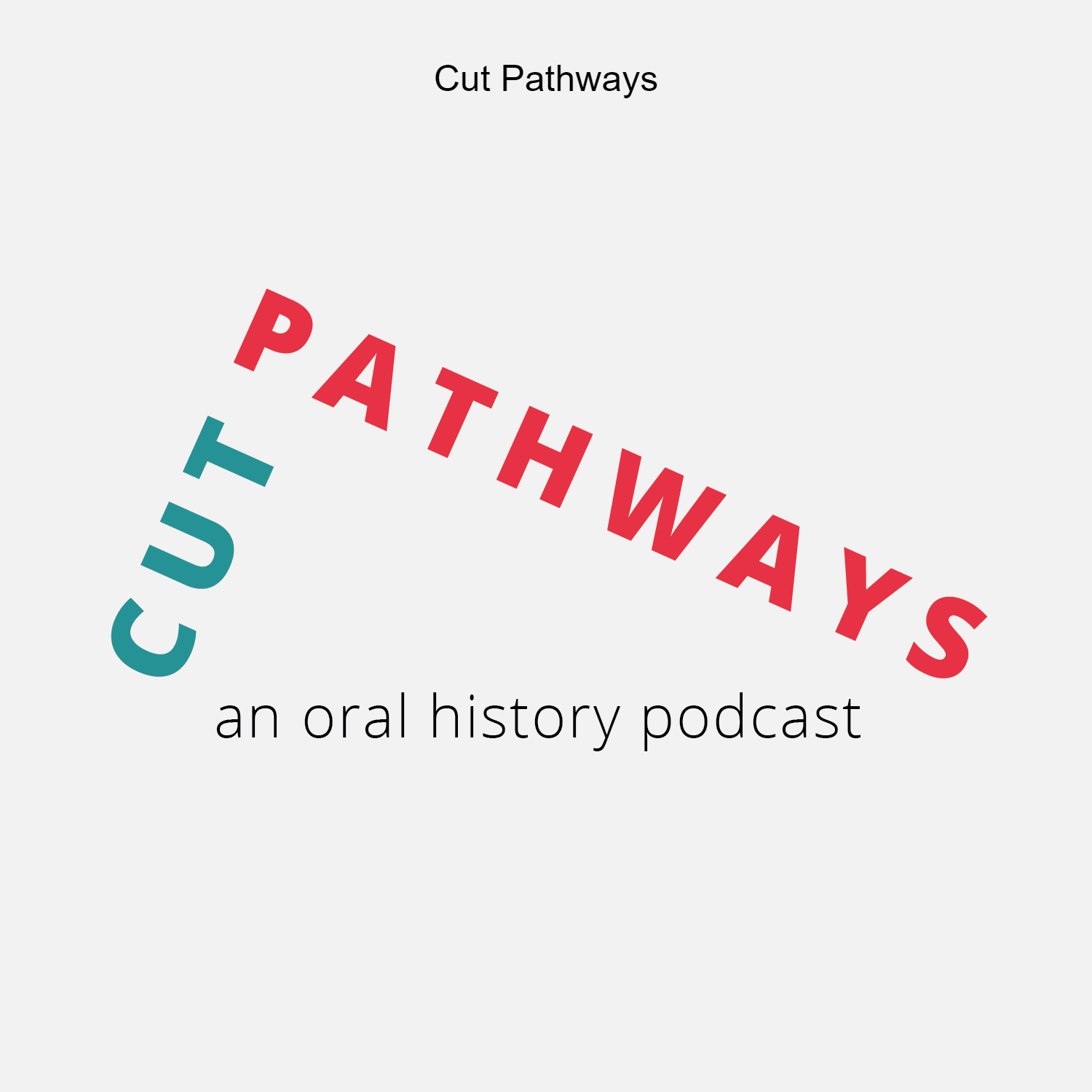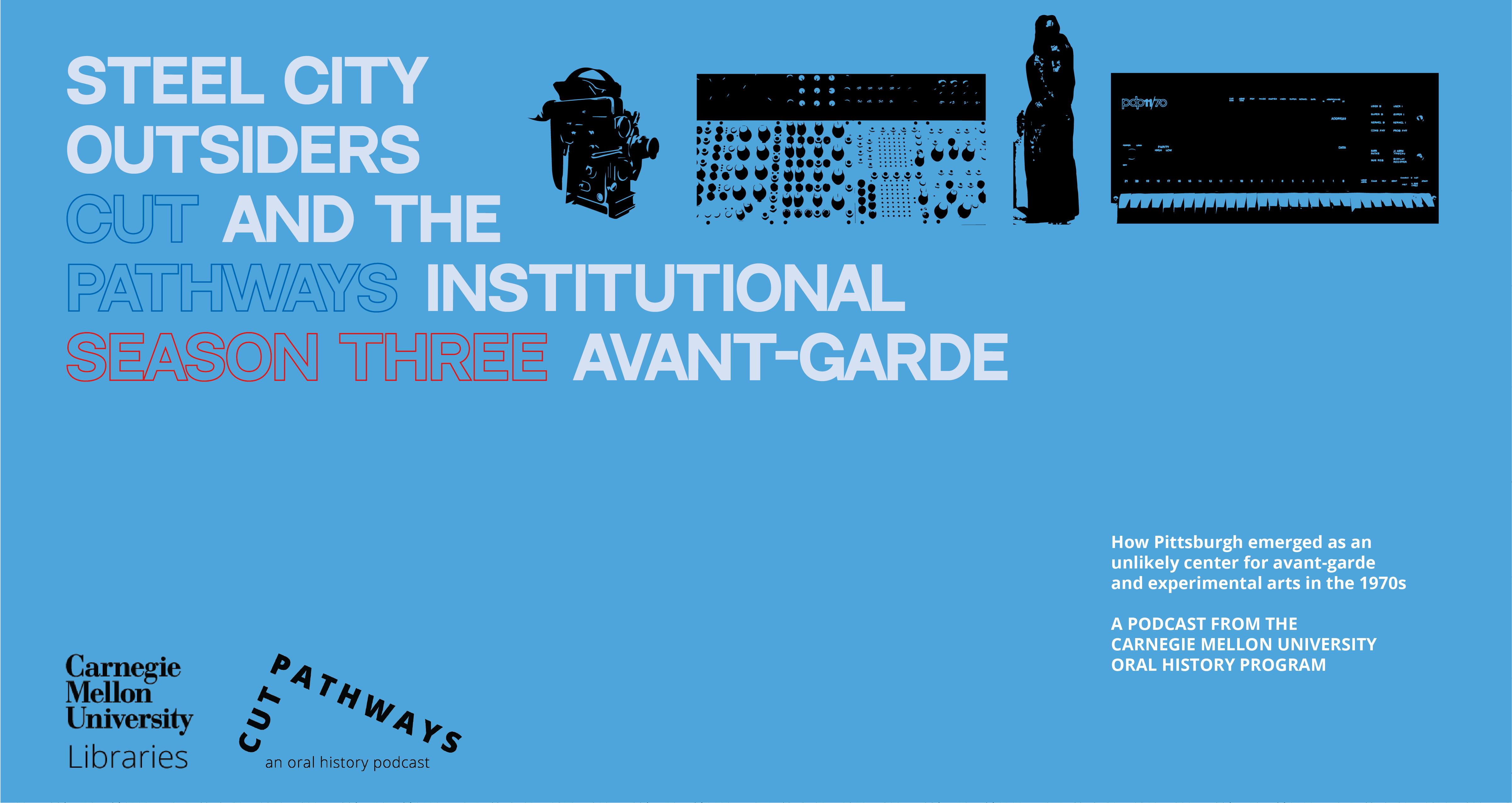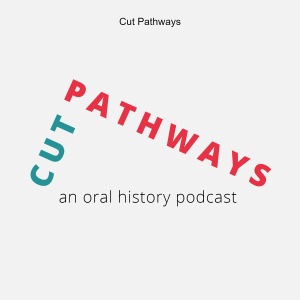
7.2K
Downloads
19
Episodes
Thanks to everyone who listened to Cut Pathways! Our special episode on artificial intelligence will be out last episode. Signing off, Katherine and Dave. ******** Cut Pathways, a podcast developed by Katherine Barbera and David Bernabo for the Oral History Program at Carnegie Mellon University in Pittsburgh, PA, showcases different pathways students and faculty take to navigate their experiences in higher education. This podcast draws on the Oral History Program’s growing archive of oral histories to take an honest look at higher education, exploring themes of culture, equality, and access to education, as well as catalytic points of personal growth, technological innovation, and creative development. Each recorded history is full of funny anecdotes, follies, triumphs, hidden connections, and, occasionally, in-the-moment realizations. Cut Pathways is hosted by Katherine Barbera and David Bernabo. To learn more about the Oral History Program, check out our website: www.library.cmu.edu/cut-pathways-podcast

Season 3: “Steel City Outsiders and the Institutional Avant-Garde”
“Steel City Outsiders and the Institutional Avant-Garde,” the third season of Cut Pathways, a podcast produced by the Carnegie Mellon University Oral History Program, investigates the history of avant-garde arts organizations and communities in Pittsburgh’s Oakland neighborhood in and around the 1970s. The season consists of seven episodes.
Episodes

Monday Mar 20, 2023
Special Episode: Futures of Artificial Intelligence
Monday Mar 20, 2023
Monday Mar 20, 2023
AI chatbots such as ChatGPT have been making headlines recently, leading to speculation about the future of AI. In this special episode, we hear from computer scientists about their hopes for the next ten, twenty, and fifty years of the field. Joseph Newcomer, Tom Mitchell, Manuela Veloso, José Moura, Roger Dannenberg, James Morris, Pamela McCorduck, and Alex Waibel—all well-known for their research in AI—discuss the potential of the field and the ethical, sociopolitical, and environmental impacts we may see in the coming years.
Artificial intelligence has deep roots at Carnegie Mellon University—it was home to founders Herbert Simon and Allen Newell—and the university continues to be at the center of its development. In some versions of the future, your alarm clock app will be able to adjust itself based on the weather. In others, chatbots will read, answer, and manage overflowing email inboxes, and an AI singer might form an AI band to make AI music. As this technology becomes more ubiquitous, it will continue impacting our world in ways we cannot always predict.

Wednesday Dec 21, 2022
Wednesday Dec 21, 2022
In 1976, punk started making headlines in New York and England, and by 1977, punk was central to a growing community of Pittsburghers in the neighborhood of Oakland. The punk scene spanned communities. The riotous onslaught of earnestly played guitars ringed through houses, bars, and the halls of Carnegie Mellon and the University of Pittsburgh. Flyers sprung up on telephone polls. At Pittsburgh Filmmakers, 8mm cameras brought in a new era of low-budget narrative filmmaking that broke from the Structuralist trends of the 1970s while still avoiding the trappings of Hollywood. This is a story about the first wave of punk in Pittsburgh.

Friday Dec 09, 2022
Friday Dec 09, 2022
In 1975, Sally Dixon left the Carnegie Museum of Art. But Bill Judson took over the Film Section, expanded the program’s offerings, and introduced video art into the galleries. Judson guided the program until it was shuttered in 2003. In this episode, we zoom in on certain details of this era. Graphic designer Maria Paul Kyros discusses the process of designing the Film Section posters. Lindsay Mattock and Ben Ogrodnik discuss the importance of the Travel Sheet. This is the continuing story of the Film Section.

Monday Dec 05, 2022
Monday Dec 05, 2022
Carnegie Mellon is often a place where art and technology meet. This episode looks at two such instances. In the late 1960s, Duane Palyka was writing programs for a Bendix G-20 computer to make art. Layers of text characters creating sweeping vector-like printed images. A decade later, computer scientist Roger Dannenberg arrived on campus. He quickly co-founded the Computer Music Project, developed MIDI-based software, and later co-created Audacity. These are stories about art and technology at CMU.

Monday Nov 21, 2022
Monday Nov 21, 2022
The Buchla synthesizer experienced a cultural reemergence through new records from composers Kaitlyn Aurelia Smith and Suzanne Ciani, but for Pittsburgh, the Buchla first arrived in 1969 when composer Morton Subotnick founded the University of Pittsburgh’s Electronic Music Studio. This episode charts the studio’s history from analog to digital. We hear stories about complications with CBS Musical Instruments, a lost George Romero film, and computers that could play synthesizers. This is the story of the University of Pittsburgh’s Electronic Music Studio.

Tuesday Oct 18, 2022
Tuesday Oct 18, 2022
Renowned sculptor Selma Burke arrived in Pittsburgh in the late 1960s to found the Selma Burke Art Center, an important hub for arts in East Liberty. With classes, lectures, and performances, the SBAC was an important meeting place for youth, local artists, and visiting creators. While not in Oakland, the SBAC is tied to our story through its funders, the Mellon Trust and the Carnegie Institute. This is the story of the Selma Burke Art Center.

Tuesday Oct 18, 2022
Tuesday Oct 18, 2022
Initially an offshoot of the Film Section, Pittsburgh Filmmakers became one of the first and largest media arts centers in the U.S., fostering a community dedicated to experimental film and photography. The organization began as an equipment in the Carnegie Museum of Art, then found space in the basement of the Selma Burke Art Center. A more permanent location was found in the Oakland neighborhood. Some call Filmmakers in the 1970s the glory days, others point to internal tensions and stresses of growing and solidifying an organization. Two things can be true. This is the story of the early days of Pittsburgh Filmmakers.

Monday Oct 10, 2022
Monday Oct 10, 2022
Avant-garde cinema found an unlikely home in the Pittsburgh neighborhood of Oakland. DIY screening events at the Crumbling Wall and New Cinema Workshop led to Sally Dixon founding the Film Section at the Carnegie Museum of Art. Throughout the 1970s and for decades after, filmmakers like Stan Brakhage, Carolee Schneemann, Hollis Frampton, and Werner Herzog visited the city, screening their films and lecturing about their work. This is the story of the Film Section.
